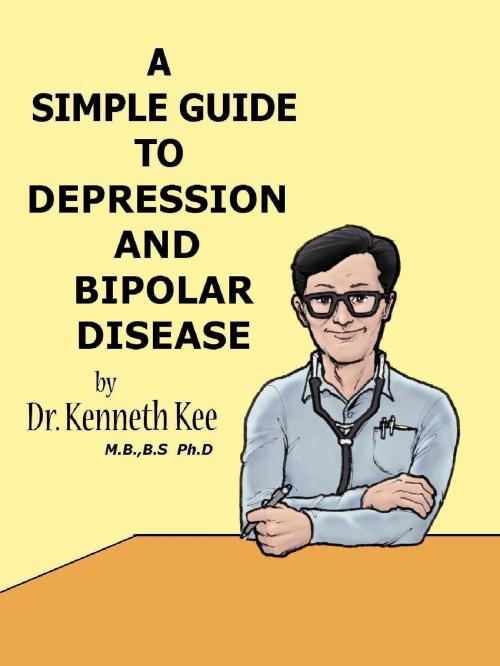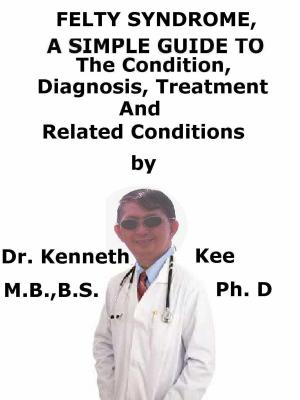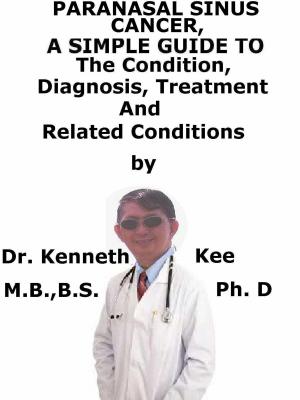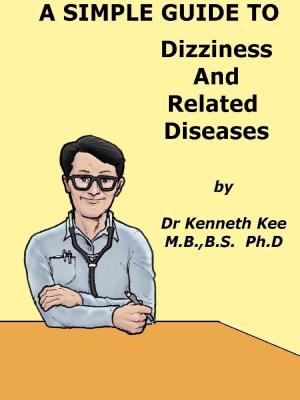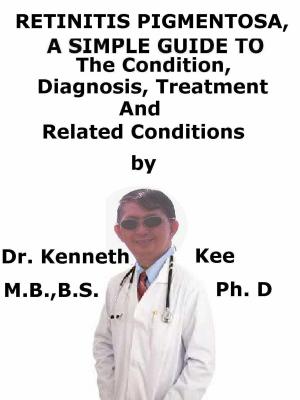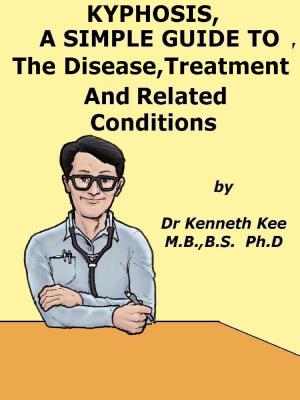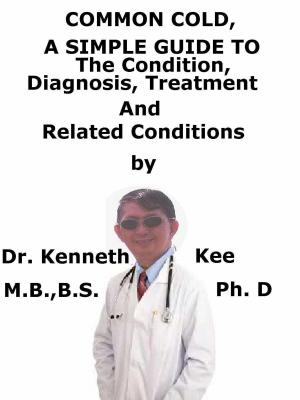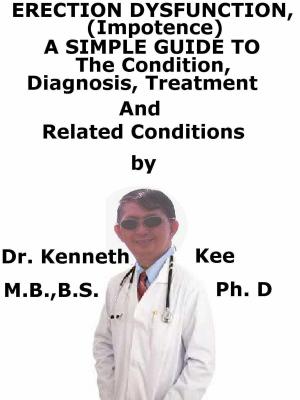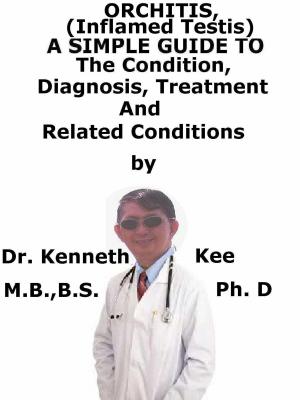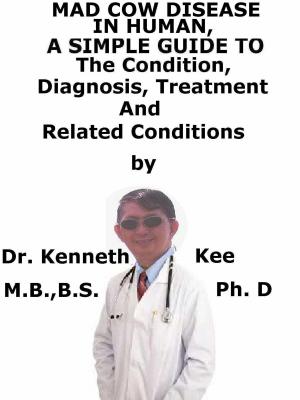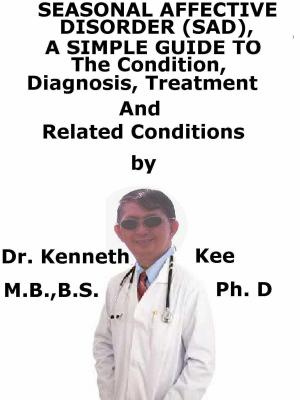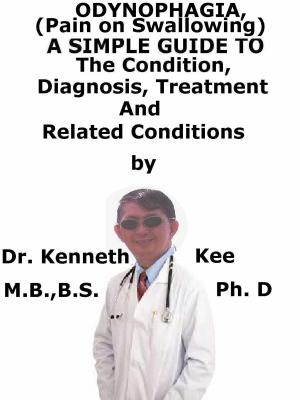A Simple Guide to Depression and Bipolar Disease
Nonfiction, Health & Well Being, Medical, Ailments & Diseases, Mental Health, Psychology| Author: | Kenneth Kee | ISBN: | 9781301730162 |
| Publisher: | Kenneth Kee | Publication: | November 13, 2012 |
| Imprint: | Smashwords Edition | Language: | English |
| Author: | Kenneth Kee |
| ISBN: | 9781301730162 |
| Publisher: | Kenneth Kee |
| Publication: | November 13, 2012 |
| Imprint: | Smashwords Edition |
| Language: | English |
Depression is a medical condition in which feelings of persistent sadness, loss, emptiness, anger, or frustration interfere with everyday life for at least 2 weeks or longer.
There are 3 types of Depression:
- Major depression
Major depression is characterized by a combination of symptoms that last for at least two weeks in a row, including sad and irritable mood that interfere with the ability to work, sleep, eat, and enjoy activities which used to give pleasure.
There may be difficulties in sleeping or eating.
- Dysthymia
Dysthymia is a less severe illness but usually longer-lasting type of depression than major depression (2 years or more).
It involves long-term symptoms that do not stop but at the same time prevent the affected person from functioning properly or feeling good.
People with dysthymia can also have episodes of major depression.
This combination of these two types of depression is often referred to as double-depression.
- Bipolar disorder (manic depression)
Another type of depression is bipolar disorder
This involves a group of mood swing disorders that were formerly called manic-depressive illness or manic depression.
These conditions may be inherited.
It is not as common as the other types of depressive disorders.
Bipolar disorders have cycles of mood changes that include at least one episode of mania or hypomania and episodes of depression as well.
Bipolar disorders are long lasting and recurring.
Sometimes, the mood swings are fast and dramatic
.
More often they are gradual.
During the depression episode, the person can experience any or all of the symptoms of a depressive disorder.
In the manic cycle, mania often affects thinking, judgment, and social behavior in ways that cause serious problems and embarrassment.
What are the causes of Depression?
- The cause of depression is not known.
In recent years, many researchers believe it is caused by
-
chemical changes in the brain.
Neurotransmitters are released by a neuron directly onto a recipient cell, while hormones typically reach their target cell via the bloodstream. -
the genes,
-
certain stressful events.
-
More likely, it's a combination of all.
Some types of depression are familial.
But depression can also occur even if you have no family history of the illness.
Anyone can develop depression of all ages even kids 8% of teens and 2% of preteens..
Who is at risk of Depression?
The following may play a role in depression:
-
Alcohol or drug abuse
-
Some medical conditions, including underactive thyroid, cancer, or long-term pain
-
Certain medications such as steroids
-
Sleeping problems
-
Stressful life events, such as:
a. Breaking up with a girlfriend or boyfriend
b. Failing a class
c. Death or illness of someone close
d. Divorce
e. Childhood abuse or neglect
f. Job loss
g. Social isolation especially in the elderly
What are the symptoms of Depression?
Symptoms:
-
a persistent sad mood
-
loss of interest or pleasure in most activities
together with following accompanying symptoms
-
more negative attitude, disbelief that any problem or situation can be solved in a positive way.
-
Feelings of helplessness and hopelessness
-
Feelings of worthlessness, self-hate, and guilt
-
Becoming withdrawn or isolated
-
Loss of interest or pleasure in activities which were once enjoyable
-
Restlessness, irritability and agitation,
-
Great change in appetite, often with weight gain or loss
-
Very difficult to concentrate
-
Fatigue and Tiredness
-
Thoughts of death or suicide
-
Trouble sleeping or excessive sleeping
-
Anger and discouragement sometimes, rather than feelings of sadness.
If depression is very severe, psychotic symptoms may appear, such as
- Hallucinations and delusions.
TABLE OF CONTENT
Chapter 1
Depression
Chapter 2
Bipolar Disease
Chapter 3
Epilogue
Depression is a medical condition in which feelings of persistent sadness, loss, emptiness, anger, or frustration interfere with everyday life for at least 2 weeks or longer.
There are 3 types of Depression:
- Major depression
Major depression is characterized by a combination of symptoms that last for at least two weeks in a row, including sad and irritable mood that interfere with the ability to work, sleep, eat, and enjoy activities which used to give pleasure.
There may be difficulties in sleeping or eating.
- Dysthymia
Dysthymia is a less severe illness but usually longer-lasting type of depression than major depression (2 years or more).
It involves long-term symptoms that do not stop but at the same time prevent the affected person from functioning properly or feeling good.
People with dysthymia can also have episodes of major depression.
This combination of these two types of depression is often referred to as double-depression.
- Bipolar disorder (manic depression)
Another type of depression is bipolar disorder
This involves a group of mood swing disorders that were formerly called manic-depressive illness or manic depression.
These conditions may be inherited.
It is not as common as the other types of depressive disorders.
Bipolar disorders have cycles of mood changes that include at least one episode of mania or hypomania and episodes of depression as well.
Bipolar disorders are long lasting and recurring.
Sometimes, the mood swings are fast and dramatic
.
More often they are gradual.
During the depression episode, the person can experience any or all of the symptoms of a depressive disorder.
In the manic cycle, mania often affects thinking, judgment, and social behavior in ways that cause serious problems and embarrassment.
What are the causes of Depression?
- The cause of depression is not known.
In recent years, many researchers believe it is caused by
-
chemical changes in the brain.
Neurotransmitters are released by a neuron directly onto a recipient cell, while hormones typically reach their target cell via the bloodstream. -
the genes,
-
certain stressful events.
-
More likely, it's a combination of all.
Some types of depression are familial.
But depression can also occur even if you have no family history of the illness.
Anyone can develop depression of all ages even kids 8% of teens and 2% of preteens..
Who is at risk of Depression?
The following may play a role in depression:
-
Alcohol or drug abuse
-
Some medical conditions, including underactive thyroid, cancer, or long-term pain
-
Certain medications such as steroids
-
Sleeping problems
-
Stressful life events, such as:
a. Breaking up with a girlfriend or boyfriend
b. Failing a class
c. Death or illness of someone close
d. Divorce
e. Childhood abuse or neglect
f. Job loss
g. Social isolation especially in the elderly
What are the symptoms of Depression?
Symptoms:
-
a persistent sad mood
-
loss of interest or pleasure in most activities
together with following accompanying symptoms
-
more negative attitude, disbelief that any problem or situation can be solved in a positive way.
-
Feelings of helplessness and hopelessness
-
Feelings of worthlessness, self-hate, and guilt
-
Becoming withdrawn or isolated
-
Loss of interest or pleasure in activities which were once enjoyable
-
Restlessness, irritability and agitation,
-
Great change in appetite, often with weight gain or loss
-
Very difficult to concentrate
-
Fatigue and Tiredness
-
Thoughts of death or suicide
-
Trouble sleeping or excessive sleeping
-
Anger and discouragement sometimes, rather than feelings of sadness.
If depression is very severe, psychotic symptoms may appear, such as
- Hallucinations and delusions.
TABLE OF CONTENT
Chapter 1
Depression
Chapter 2
Bipolar Disease
Chapter 3
Epilogue
